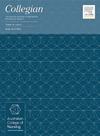A systematic review of interventions for reducing and reporting adverse events in emergency departments: Multidisciplinary approaches and technological innovations
IF 1.7
4区 医学
Q2 NURSING
引用次数: 0
Abstract
Background
Adverse events in hospital emergency departments remain significant health problems that pose a serious threat to the patients with resultant detrimental outcomes. However, effective strategies for their reduction and reporting remain understudied.
Aim
This review aims to evaluate interventions for reducing and reporting adverse events in emergency settings.
Methods
We conducted a systematic search across six major scientific databases, including PubMed and Cochrane, for papers published between 2001 and 2024 to capture a broad range of interventions. A PRISMA protocol for systematic review methodology was applied. Included were studies evaluating interventions aimed at reducing adverse events and improving the reporting processes in emergency departments. According to predefined guidelines, data extraction and quality assessment for randomised controlled trials and non-randomized experimental research were completed using the Joanna Briggs Institute critical appraisal tool. Analysis was done on 12 papers that met the criteria for inclusion.
Findings
Key interventions included multidisciplinary staff training, the implementation of electronic health record systems with decision-support tools, and standardised triage protocols, all of which demonstrated a reduction in adverse events. Standardised triage protocols and simulation scenarios were effective in reducing adverse events. Meanwhile, electronic health record systems with decision support tools, machine learning integration, and electronic medication alerts significantly improved reporting practices.
Conclusion
The review highlights the importance of multifaceted strategies, particularly those integrating technology and collaborative approaches, to improve safety culture in emergency departments. Future research should focus on long-term evaluations of these interventions in diverse healthcare settings, with a particular emphasis on resource-limited environments and the scalability of technological solutions.
Study registration details
The protocol is registered in the International Prospective Register of Systematic Reviews with registration number ‘CRD42024532902’.
减少和报告急诊科不良事件的干预措施的系统回顾:多学科方法和技术创新
医院急诊科的不良事件仍然是严重的健康问题,对患者构成严重威胁,并产生有害的后果。然而,减少和报告的有效战略仍未得到充分研究。目的本综述旨在评价紧急情况下减少和报告不良事件的干预措施。方法:我们对包括PubMed和Cochrane在内的六个主要科学数据库进行了系统检索,检索了2001年至2024年间发表的论文,以获取广泛的干预措施。采用了系统评价方法的PRISMA方案。其中包括评估旨在减少不良事件和改进急诊科报告程序的干预措施的研究。根据预先设定的指南,使用Joanna Briggs Institute关键评估工具完成随机对照试验和非随机实验研究的数据提取和质量评估。对符合纳入标准的12篇论文进行了分析。主要干预措施包括多学科工作人员培训,实施带有决策支持工具的电子健康记录系统,以及标准化的分诊方案,所有这些都表明不良事件的减少。标准化的分诊方案和模拟场景在减少不良事件方面是有效的。与此同时,具有决策支持工具、机器学习集成和电子药物警报的电子健康记录系统显著改善了报告实践。结论该综述强调了多方面策略的重要性,特别是那些将技术和协作方法相结合的策略,以改善急诊科的安全文化。未来的研究应侧重于在不同的医疗环境中对这些干预措施的长期评估,特别强调资源有限的环境和技术解决方案的可扩展性。研究注册细节该方案已在国际前瞻性系统评价注册中注册,注册号为“CRD42024532902”。
本文章由计算机程序翻译,如有差异,请以英文原文为准。
求助全文
约1分钟内获得全文
求助全文
来源期刊

Collegian
NURSING-
CiteScore
2.70
自引率
6.70%
发文量
127
审稿时长
72 days
期刊介绍:
Collegian: The Australian Journal of Nursing Practice, Scholarship and Research is the official journal of Australian College of Nursing (ACN).
The journal aims to reflect the broad interests of nurses and the nursing profession, and to challenge nurses on emerging areas of interest. It publishes research articles and scholarly discussion of nursing practice, policy and professional issues.
Papers published in the journal are peer reviewed by a double blind process using reviewers who meet high standards of academic and clinical expertise. Invited papers that contribute to nursing knowledge and debate are published at the discretion of the Editor.
The journal, online only from 2016, is available to members of ACN and also by separate subscription.
ACN believes that each and every nurse in Australia should have the opportunity to grow their career through quality education, and further our profession through representation. ACN is the voice of influence, providing the nursing expertise and experience required when government and key stakeholders are deciding the future of health.
 求助内容:
求助内容: 应助结果提醒方式:
应助结果提醒方式:


